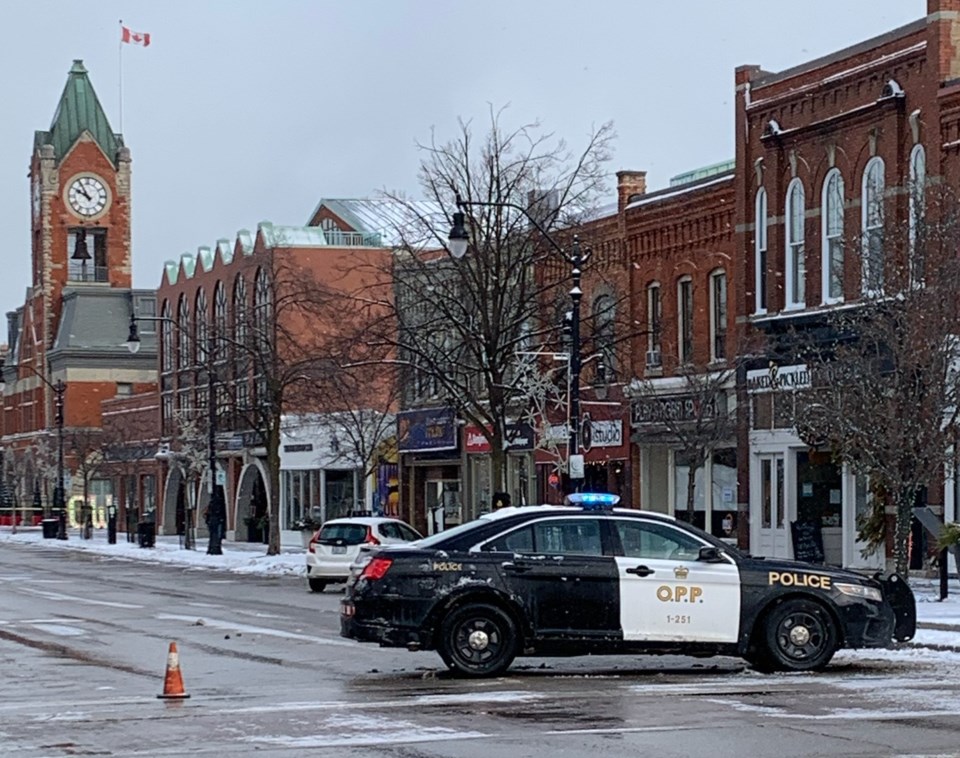The costs of Collingwood's Ontario Provincial Police will be going up by 37 per cent in 2025, which could translate to a seven per cent tax increase next year right off the top before council even has a chance to look at the entire 2025 budget.
During council’s regular meeting on Oct. 21, chief administrative officer Sonya Skinner gave an update on the costs of Collingwood OPP to the taxpayer next year, which she and other members of the Collingwood OPP Detachment Board received two weeks ago, but had not yet fully been made public.
“I am totally shocked and disgusted and we’ll be pursuing this... I'm not sure to what end,” said Mayor Yvonne Hamlin, noting the town would be contacting the OPP to see if the increase could be phased in.
“This is a terrible thing we’re going to have to deal with,” said Hamlin. “It’s just not fair to our community to get this level of a hit for one year.”
In 2024, the town was billed $5.2 million for the services provided by Collingwood OPP. Next year, the bill will be $7.1 million.
Skinner said the town did not have any communication from the OPP in advance of being notified of the increase two weeks ago.
“It was quite a bit higher than we had expected,” said Skinner. “It was somewhat astonishing.”
Skinner said the issue will be brought forward as part of the 2025 budget, for the town to consider how to minimize the impact to the taxpayer, but added it would be difficult with these types of increases. As the town is locked into a contract with the Collingwood OPP, they have little say over whether the town will pony up the extra funds. She said the town has contacted the OPP to make sure the billing numbers are accurate.
She noted that all municipalities across Ontario are subject to the new increase, but in speaking with towns nearby such as Wasaga Beach, their increase is coming in at 20 per cent and there has been no explanation given as to why Collingwood’s increase is so much higher than others.
“Why is there a 17 per cent difference between us and Wasaga Beach, when they might have more residents than we do?” asked Coun. Rob Ring.
Skinner speculated that Collingwood having its own court – whereas other surrounding municipalities do not – could have had an impact. She also mentioned that having the school resource officer positions in Collingwood is a value-added option and not a requirement, but overall, she was unsure.
“It’s not clear to me why it’s happening and how we’re different than our adjacent municipalities,” said Skinner.
Skinner noted during her remarks that as a one per cent increase in taxes in Collingwood translates to $370,000 in spending, the OPP increase will account for a seven per cent tax increase right off the top of the 2025 overall budget.
“Certainly we will try to mitigate, but this will very much impact the things we bring forward and how council may sort your priorities for the coming year,” she said.
The local Collingwood OPP detachment has no input on the billing, which is done through OPP’s corporate office.
Erin Cranton of the OPP’s corporate communications bureau told CollingwoodToday in an email that the OPP recognizes that there are concerns about the cost of policing services next year.
She said under the current OPP billing model, all municipalities are paying the same base services cost per property, plus additional costs for calls for service, overtime, accommodations, cleaning services, prisoner transportation, court security and enhancements. Cranton estimates that the cost for policing per average household for 2025 will be $399.
“Municipal policing costs increased in the 2025 annual billing statements due to both an increase in OPP salaries and benefits that resulted from the ratification of the 2023-2026 OPPA Uniform and Civilian agreements and a return to pre-pandemic workload levels,” said Cranton, adding that salaries and benefits account for about 90 per cent of OPP municipal policing costs.
She said that costs for components such as court security, prisoner transportation and in some cases, calls for service all decreased during the pandemic as many court proceedings were done virtually. As costs tend to take two years to reconcile, this meant that for the past two years costs were down, but are now coming back up the further away the lockdown pandemic days are in the rear-view mirror.
“In 2023, activity levels among these billing components generally rebounded to pre-pandemic trend levels. This resulted in costs that were higher than those estimated in 2024, both due to this activity level rebound as well as the salary rate increase,” she said.
“While this is the highest per property cost since the implementation of the OPP billing model in 2015, this cost continues to compare favourably to other police services in Ontario,” she said.
She noted that all Ontario municipalities are responsible for providing policing to their communities.
“The OPP is one of numerous police services that have recently ratified new collective agreements resulting in salary increases for members,” she said.
During council remarks, Coun. Chris Potts shared concern that residents would demand an increased level of service to correspond with the increased cost, and asked how residents can share their concerns.
Skinner said concerns can be shared with any member of the Collingwood OPP Detachment Board. More information on the board including how to contact them can be found here.
For more information on the OPP billing model, click here.
